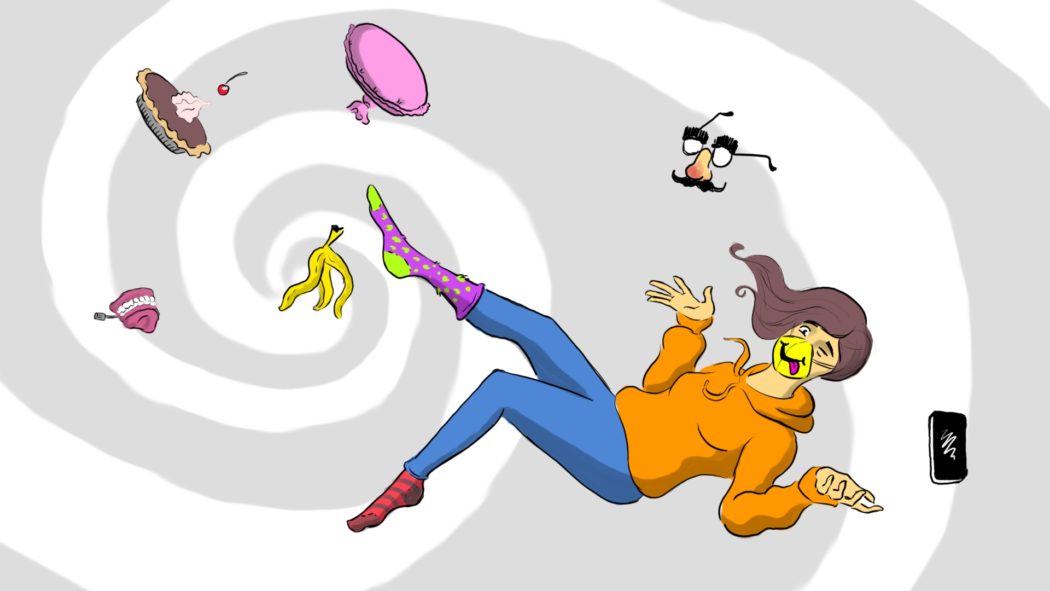Opinion: Satire is the best medicine
“Saturday Night Live” is the modern-day Mark Twain. Like Mark Twain, “SNL” recognizes the power and absurdity of the mundane and uses satire to enact change. Through humor “SNL” reveals deep truths that might be difficult to face without the company of a laugh.
“SNL” is brilliant not because of it’s hilarious cast or A-list hosts, but because it examines our culture and makes light of our humanity.

Tina Fey and Amy Poehler in Weekend Update (2012).

Colin Jost and Michael Che in Weekend Update (2018).
“Weekend Update” has become a staple on the show because of its farcical take on culture. During this segment, fake news anchors turn legitimate news stories into quippy lines that strike at the dark but funny core of a story.
The “Weekend Update” anchors are able to commentate on a story in a way that a real news anchor never could. Objectivity and correctness prevent the real news cycle from infusing personality and irony into their reports. Weekend Update is not burdened with those same responsibilities. This allows them to draw conclusions and provoke thought through edgy jokes that dissect the heart of American culture.
The heart and soul of the show lies in the more ordinary sketches like “Return Counter.” The setting is a return counter at a Kmart and the plot is simply customers approaching the counter and trying to return items. The sketch ends up tackling big issues like the very American ideology that “the customer is always right,” free market consumerism, and even the spreading of incorrect information on social media platforms— a lot for four minutes of airtime.
Sketches like “Return Counter” are effective because they connect with us universally. Who hasn’t stood in a return line or watched a worker at Walmart put up with more from a customer than they get paid for? Who hasn’t been yelled at by a customer about something that is completely out of their control? If you’ve worked in customer service or retail, you absolutely have.
If while watching “Return Counter” you find yourself identifying with the outrageous characters in front of the counter, “SNL” gives you an opportunity to laugh at yourself—an enjoyable way to recognize you were wrong.

Chris Redd, Saoirse Ronan and Mikey Day in Return Counter (2017).
“SNL” conveys the message that we are not alone in our experiences or our ignorance. For generations “SNL” has been making us laugh at common situations and making mistakes and humiliation feel like an initiation to an exclusive national club.
We live in a culture of social correctness and, while that is an admirable goal, we must not forget that to err is human. We cannot get so caught up in being right that we forget how often we are wrong.
Somewhere along the way, we decided that it is better to lie or hide our flaws than it is to accept our faults as an opportunity for growth. “SNL” blatantly confronts the incorrectness in society to throw this notion out the window and, in turn, provides an avenue for improvement.
Mark Twain, the king of satire, said “Humor is the great thing, the saving thing after all. The minute it crops up, all our hardnesses yield, all our irritations, and resentments flit away, and a sunny spirit takes their place.” He knew that humankind was and is too stubborn to simply admit they are wrong. We need to be coaxed out of our prejudices with a joke.
We must laugh at ourselves to recognize our own stupidity and acknowledge our humanity. Laughter is the first step on the road to recovery. When we see the comedy in the situation, we can move forward to a better day.

Addy Kirkham is a senior studying English with an emphasis in literary analysis. She enjoys reading, running, and mountain biking.
addy.kirkham@usu.edu

